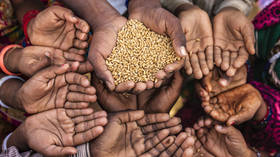Hidden sanctions could spark global famine – Russian Grain Union

Grain exporters are being hit by indirect sanctions, with Western businesses unable to provide services critical to the industry, the head of the Russian industry organization has outlined in an interview with RT.
Russian Union of Grain Exporters boss Eduard Zernin explained that even though the foodstuff is exempt from sanctions imposed by Western powers, firms located or registered in those countries were systemically refusing to work with Russian suppliers.
“Among them are banking institutions of this or that country that have been rejecting payments, or vessels flying the flag of this or that country that suddenly stopped entering Russian ports despite all the valid licenses,” Zernin said. “We have seen a wave of individual initiatives, the scale of which was massive.”
Russia accounts for more than 20% of the world’s grain shipments, the official noted, adding that the latest attempts “to erase or cancel Russian produce from global markets has failed,” as the elimination of such a prodigious amount of supplies would inevitably trigger a global food crisis.
“Direct pressure is impossible, but if we face another upsurge in disguised sanctions targeting shipments of Russian grain, famine may be inevitable,” he warned.
According to Zernin, the hidden sanctions applied to Russian exporters last year sent prices for wheat surging from $300 to $450 per ton.
He added that prices began declining only when those restrictions were eased, after the Russian Union of Grain Exporters raised concerns on the international level, having alerted the United Nations to the issue.
“We have faced and are still facing challenges related to banking operations,” Zerin said. “We managed to resolve nearly all the issues relating to fleets, partly arising from increased freight tariffs.”
According to the head of the union, Russian grain exporters have also been cut off from the legal regulation platform as part of Western restrictions.
“As a result, we are not able to resolve any legal disputes at specialised arbitration platforms,” he said.
Zernin noted that the Russian Union of Grain Exporters has had to establish direct contacts with major importers of agricultural produce, to reduce the impact of sanctions.
“We have defined our focus markets, such as the Middle East and North African countries, the world’s biggest grain consumers, we have established direct ties with them, and developed new strategies for trading with every nation separately,” he explained.
According to the official, Russian exporters now work either under Russian legislation or follow the requirements of domestic laws of partners, staying out of global legislative framework.
For more stories on economy & finance visit RT's business section













